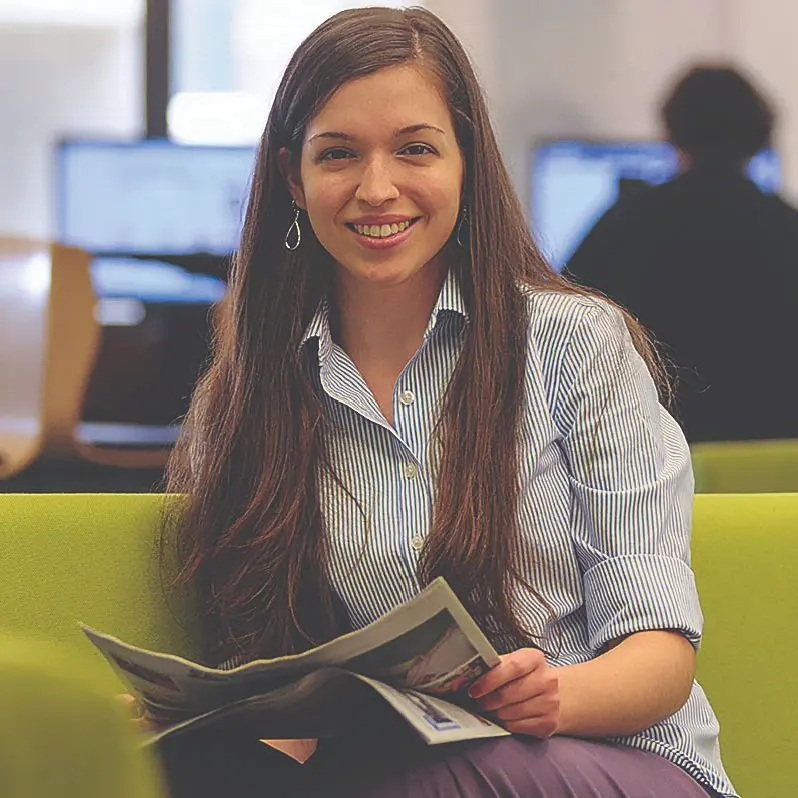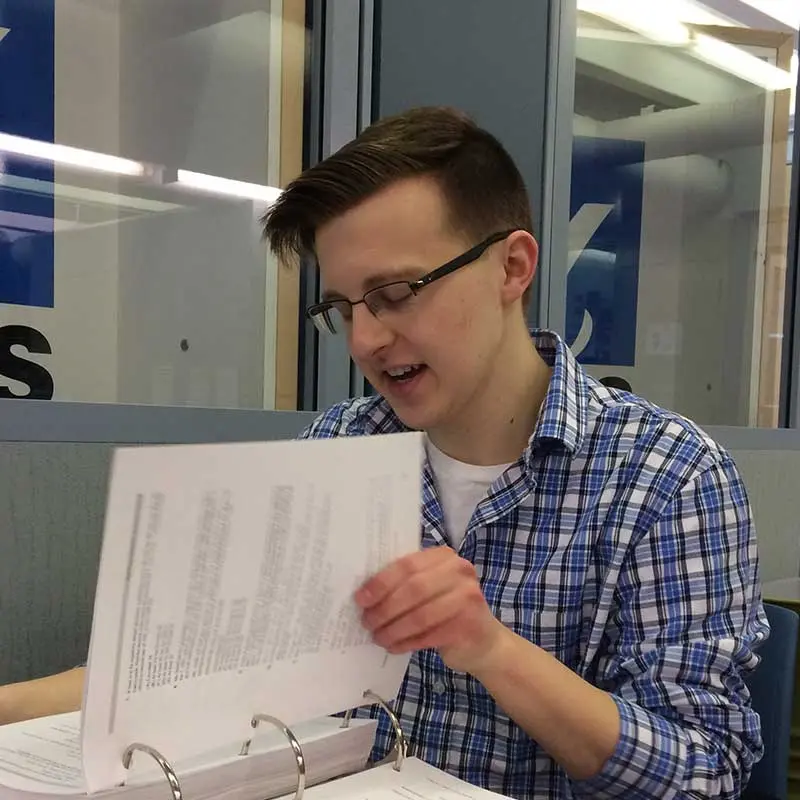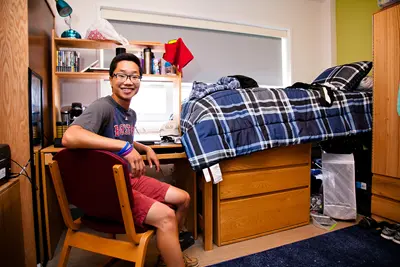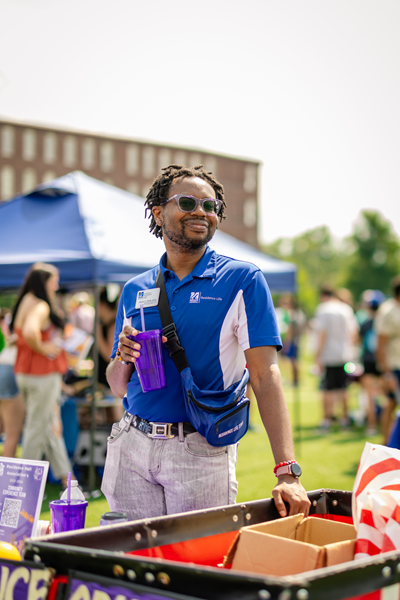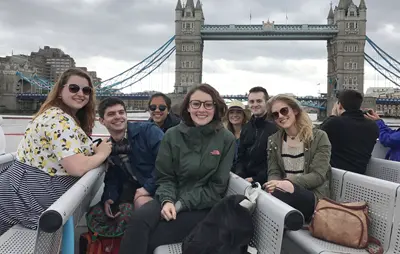For students who entered fall 2015 and beyond.
Freshman Year
Fall Semester
| Course Number | Course Name | Credits |
|---|
ENGL.1010 /
HONR.1100 | College Writing I /
First Year Seminar in Honors: Text in the City (CW) | 3 |
| ECON.2010 | Principles of Microeconomics | 3 |
| FAHS.1090 | First Year Seminar2 | 1 |
| MATH.1210 | Pre-calculus1 | 3 |
| xxxx.xxxx | Social Science Perspective (SS) | 3 |
| xxxx.xxxx | Arts and Humanities Perspective (AH) | 3 |
| Total | 16 |
Spring Semester
| Course Number | Course Name | Credits |
|---|
| ENGL.1020 | College Writing II (CW) | 3 |
| ECON.2020 | Principles of Macroeconomics | 3 |
| MATH.1220 | Management Calculus1 (Math Perspective - MATH) | 3 |
| xxxx.xxxx | Arts and Humanities Perspective (AH) | 3 |
| xxxx.xxxx | Sciences with Lab Perspective (SCL) | 3-4 |
| Total | 15-16 |
Sophomore Year
Fall Semester
| Course Number | Course Name | Credits |
|---|
| ECON.3030 | Microeconomic Theory (AIL), (QL) | 3 |
| ECON.2110 | Statistics I | 3 |
| xxxx.xxxx | Social Sciences Perspective (SS) | 3 |
| xxxx.xxxx | Sciences with Lab Perspective (SCL) | 3-4 |
| xxxx.xxxx | Free Elective | 3 |
| Total | 15-16 |
Spring Semester
| Course Number | Course Name | Credits |
|---|
| ECON.3040 | Macroeconomic Theory (CTPS) | 3 |
| ECON.2120 | Statistics II (IL), (WOC) | 3 |
| ECON.3/4xxx | Economics Elective (3000/4000 level) | 3 |
| ECON.3/4xxx | Economics Elective (3000/4000 level) | 3 |
| xxxx.xxxx | Free Elective | 3 |
| Total | 15 |
Junior Year
Fall Semester
| Course Number | Course Name | Credits |
|---|
| ECON.3/4xxx | Economics Elective (3000/4000 level) | 3 |
| ECON.3/4xxx | Economics Elective (3000/4000 level) | 3 |
| xxxx.xxxx | Arts and Humanities Perspective (AH) | 3 |
| xxxx.xxx | Free Elective (DCA)3 | 3 |
| xxxx.xxxx | Free Elective | 3 |
| Total | 15 |
Spring Semester
| Course Number | Course Name | Credits |
|---|
| ECON.3/4xxx | Economics Elective (3000/4000 level) | 3 |
| ECON.3/4xxx | Economics Elective (3000/4000 level) | 3 |
| xxxx.xxxx | Social Sciences Perspective (SS) | 3 |
| xxxx.xxxx | Free Elective (SRE)4 | 3 |
| xxxx.xxxx | Free Elective | 3 |
| Total | 15 |
Senior Year
Fall Semester
| Course Number | Course Name | Credits |
|---|
| xxxx.xxxx | Free Elective | 3 |
| xxxx.xxxx | Free Elective | 3 |
| xxxx.xxxx | Free Elective | 3 |
| xxxx.xxxx | Free Elective | 3 |
| xxxx.xxxx | Free Elective | 3 |
| Total | 15 |
Spring Semester
| Course Number | Course Name | Credits |
|---|
| xxxx.xxxx | Free Elective | 3 |
| xxxx.xxxx | Free Elective | 3 |
| xxxx.xxxx | Free Elective | 3 |
| xxxx.xxxx | Free Elective | 3 |
| xxxx.xxxx | Free Elective | 3 |
| Total | 15 |
Total Minimum Credits = 120.
1Economics majors are required to complete specific Calculus math courses. This math requirement can be satisfied through the following options:
Economics majors who satisfy this math requirement are exempted from meeting the World Language requirement.
2Required for entering freshmen in the College of Fine Arts, Humanities and Social Sciences.
3/4Core Curriculum Essential Learning Outcomes in the major are met as follows:
- Diversity and Cultural Awareness (DCA) is met by taking ECON.3020 or any other DCA course.
- Information Literacy (IL) is met by taking ECON.2120
- Social Responsibility and Ethics (SRE) is met by taking ECON.3450 or any other SRE course.
- Written and Oral Communication (emphasizing Writing in the Discipline) (WOC) is met by taking ECON.2120
- Critical Thinking and Problem Solving (CTPS) is met by taking ECON.3040
- Applied and Integrative Learning (AIL) is met by taking ECON.3030
- Quantitative Literacy (QL) is met by taking ECON.2010 or ECON.3030.
A major in Economics consists of 36-54 Economics credits with at least 18 credits at the 3000 level or higher. Students transferring to the college and wishing to major in Economics must make individual arrangements with the department chairperson regarding satisfaction of major course requirements.
For students who entered prior to fall 2018:
Students majoring in Economics must maintain at least a 2.000 grade point average (GPA) overall and at least a 2.000 GPA in their Economics courses.
For students who entered fall 2018 and beyond:
Students majoring in Economics must maintain at least a 2.200 grade point average (GPA) overall and at least a 2.000 GPA in their Economics courses.
No more than two Breadth of Knowledge courses can be taken with the same prefix. The Core Curriculum courses may be taken in any sequence. Refer to the Core Curriculum policy for further details. You should meet with your faculty advisor to determine how you will meet the Core Curriculum requirements.
Current UMass Lowell students should use their Advisement Report in SIS. If you need assistance, please contact your advisor.
Restriction on off-campus study:
Be advised that any course taken at another institution must be formally approved prior to enrollment.
See the catalog policy for details.


